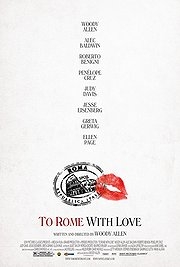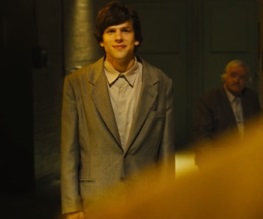To Rome With Love

To Rome With Love (Allen hates the title as well, it’s not just you), is notable for marking the return to the screen of the great man himself, having last acted in his 2006 movie Scoop. Allen doesn’t hog the screen, though, and indeed – titular city aside – To Rome With Love doesn’t really have a star, because it doesn’t really have a main plot. What we do have is a series of four vignettes, which occur at the same time, but entirely seperate from one-another. There’s no great climax where the stories all collide and come together; it’s just four things happening in the same place.
Woody Allen plays retired opera-director Jerry (alternatively: Woody Allen plays Woody Allen), who travels to Rome to meet his daughter (Alison Pill)’s new Italian fiance Michelangelo (that’s with a ‘Meek’, not a ‘Mike’, much to Jerry’s chagrin), only to inadvertently hear Michelangelo’s mortician father Giancarlo singing in the shower, and embarking on a crusade to get him to perform opera for real (Giancarlo is played by genuine tenor Fabio Armiliato). Then there’s Roberto Benigni’s boring every-man who finds himself propelled to national fame – for absolutely no reason.
Jesse Eisenberg‘s Jack, meanwhile, is visited by his Ghost of Christmas Future as Alec Baldwin plays a future version of Jack (this is left unsaid, but it’s pretty obvious), and who acts as his interior monologue/conscience, tearing apart his life-choices – in particular his decision to get involved with Ellen Page‘s sexual but oh-so-faux Monica. Finally, in the all-Italian quarter, milquetoast newly-weds Antonio and Milly find themselves seperated and having their fidelity and chastity tested during a series of comic mishaps, involving Penelope Cruz‘s prostitute and Antonio Albanese’s famous actor.
As you can tell, there’s plenty going on here, but with so many characters flitting around – coupled with the less-than-serious tone – it’s hard to connect to any of them. You’re interested in what happens, but you don’t care.
All of the stories feature their share of weirdness and farce, be it Baldwin’s fourth-wall breaking and meta commentary on his quart of the story, Allen’s opera production (Giancarlo can only sing in the shower – even on stage), or the extended comedy skit of a nobody having his mundane existence become the subject of rolling news for no reason (“We’re covering that shave live, from the first to the last stroke”), and perhaps it’s that which creates this distance. These stories exist in a reality masquerading as fantasy (or perhaps it’s the reverse?), and while there’s fun to be had in the above (Baldwin is excellent at tearing apart Monica’s affectations and ‘personality’ – “Oh God! Here comes the bullshit!”), more substance might not have gone amiss. The closest the film comes to having a heart is in the poor innocents Milly and Antonio, who are engaging and sympathetic, even as temptation gets the better of them. They’re the one’s you want to see come out on top, although lovestruck Eisenberg’s character is also endearing; entirely self-aware but powerless to resist.
The film has a few points to make, primarily in its obvious but effective assassination on the culture of fame and celebrity (at one point the Berigni story recalls baffled BBC News legend Guy Goma), and it’s nice to see Woody Allen back in front of the camera, with a few classic Allen-isms. Upon first meeting Allen’s Jerry in a funeral parlour, Giancarlo asks “has somebody died?”, only for Allen to retort without missing a beat, “No, but it’s early”. The jaunty soundtrack and warm palette – along with Allen’s creative choices – clearly indicate that this is meant to be fun. But it isn’t. It just washes over you, like a beautiful sunset that you know is out there, but you can’t quite see because you’re stuck indoors, behind a window. You see what’s going on, but you don’t get the full effect. If To Rome With Love is a post-card from a city, it’s one sealed in a perspex box that removes you from the experience.
The film has plenty of spirit, but no soul, and little heart, and the script just isn’t funny enough to get away with that. You might smile, but you won’t really laugh. What we’re left with is a gently amusing but ultimately superficial experience.







Recent Comments